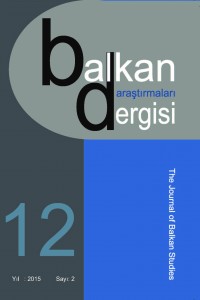Öz
The article deals with the rapport between
nationalism and communism in Albania after WWII. Dogmatically, both communism
and nationalism as ideologies are incompatible with each other. That is because
the first one considers as primary important the Marxist ideology of the
proletarian internationalism, which means the world proletarian state, while
the second one is focused on the supreme sovereignty of the nation;
indivisibility of the political unity with the national one, or the individual
awareness that his loyalty belongs to the nation.
According to orthodox Marxism, the communist
are internationalists. However, Marx was initially revised on
this matter by Lenin, and later on, by Stalin. They identified several cases when communists may refer to their
national feelings, and yet again they considered as “a high priority task of
the communist parties” to confront nationalism and preserve peoples from its
general epidemics.
Considered as rival ideologies, communism and
nationalism in Albania have had quite different
histories. The former was a new experience, imported and with no strong social
foundations. The latter was born, grown up, and rooted in for more than a
century; it was even consolidated during the resistance against the invaders,
throughout the Second World War. For the communist leaders, it was clear that
the traditional nationalism was an ideology from which it was very difficult to
give up. For that reason, they attempted to adapt it to the needs of the
communist ideology. Depending on the regime requirements for an internal social
and political cohesion, the creation of alliances and support to the
consolidation of international positions of the Albanian state, and last but
not least, the preservation of power by the highest ranking political leaders,
over time, we have witnessed consolidation or reduction of the intensity of
nationalist efforts.
Anahtar Kelimeler
Kaynakça
- Bibliography
- Arkivi i Institutit të Historisë (AIH), A. VIII. 208.
- Arkivi i Ministrisë së Jashtme (AMJ), V. 1946, D. 150, p. 77.
- Arkivi Qendror i Republikës së Shqipërisë (AQSH), Fondi 14/AP, Viti, 1943, Dosja 39.
- BOÇI, Sonila, Minoritetet në Shqipëri Midis Identitetit dhe Integrimit 1939-1949, Kristalina-KH, Tiranë, 2012.
- Elizabeth of Jean-Paul Chance, Shqipëria ose Llogjika e Dëshpërimit, Ele-na Gjika, Tiranë, 2000.
- FISCHER, Bernd J., “Enver Hoxha dhe Diktatura Staliniste në Shqipëri: Diktatorët e Ballkanit edited by B. J. Fischer, Instituti Shqiptar për Studime Ndërkombëtare, Tiranë, 2008.
- FISCHER, Bernd J., Shqipëria Gjatë Luftës 1939-1945, Çabej, Tiranë, 2004.
- FRASHËRI, Kristo, Mbi historinë e Ballit Kombëtar, Vështrim Kritik, Dudaj, Tiranë, 2012.
- GELLNER, Ernest, Nations and Nationalism, Blackwell Publishers, 1983.
- GJILAS, Milovan, Fytyra e totalitarizmit, Fan Noli, Tiranë, 2006.
- GLENNY, Misha, Histori e Ballkanit 1804-1999: Nacionalizmi, Luftërat dhe Fuqitë e Mëdha, Shtëpia e Librit dhe e Komunikimit and Toena, Tiranë, 2007.
- HOXHA, Enver, Hrushovianët (The Khrushcheviens), 8 Nëntori, Tiranë, 1980.
- HOXHA, Enver, Mbi Shkencën, vol. I, 8 Nëntori, Tiranë, 1985.
- Hoxha, Enver, Vepra (Works) 10, Naim Frashëri, Tiranë, 1972, p. 487.
- HOXHA, Enver, Vepra 35, 8 Nëntori, Tiranë, 1982.
- KOHN, Hans, Nationalism: Its Meaning and History, Toronto, London, New York, Princeton, New Jersey: D. Van Nosstrand company, inc., 1965.
- Kongresi i I-rë i Partisë Komuniste të Shqipërisë (PKSH) (The First Congress of the Albanian Communist Party) (ACP), (8-22 November 1948), publication of Albanian Communist Party: Tiranë 1950, From the report of Enver Hoxha, held in this congress.
- LALAJ, Ana, “Civil War in Greece and Albania”, unpublished paper held in the Conference “Albania’s Implications in the Greek Ci-vil War, 1946-1949”), organized by London School of Economics (LSE) and Constantine Karamanlis Institute for Democracy, At-hens, Greece, on 26-29 May 2011.
- LALAJ, Ana, “Nga “nacionalizmi komunist” deri te kolapsi nacion-al”, in: Studime Historike, nr. 1-2, Tiranë, 2007.
- LALAJ, Ana, “Shqipëria e Informbyroja”, in: Studime Historike, 3-4, Tiranë, 2009.
- Marrëdhëniet Shqiptaro-Jugosllave (1945-1948), summary of documents published by Ndreçi Plasari and Luan Malltezi, Tiranë, Arkivi Qendror i Shtetit, 1996.
- META, Beqir, Tensioni Greko-Shqiptar 1939-1949, GEER, Tiranë, 2000.
- PIPA, Arshi, Stalinizmi Shqiptar, Anatomia e një Patologjie Politike, IKK&Princi, Tiranë, 2007.
- PRIFTI, Peter R., Socialist Albania Since 1944, Domestic and Foreign Development, Cambridge, Massachusetts and London, England, MIT Press, 1978.
- RAGO, Paolo, Tradita, Nacionalizmi dhe Komunizmi në Shqipërinë Bashkëkohore, Dudaj, Tiranë, 2011.
- Shqipëria në Dokumentet e Arkivave Ruse, prepared for publication by Islam Lauka and Eshref Ymeri, Toena, Tiranë, 2006.
- STALIN, Josef V., Vepra, Vol. 2, Tiranë, 1954.
- SULSTAROVA, Enis, Ligjërimi Nacionalist në Shqipëri, Rilindja Kombëtare, Komunizmi, Postkomunizmi, Afërdita, Tiranë, 2003.
- The Current Situation in Albania, doc. 235066 of Central Intelligence Agency (CIA), published on 17 Dec. 1949.
Ayrıntılar
| Bölüm | Makaleler |
|---|---|
| Yazarlar | |
| Yayımlanma Tarihi | 30 Aralık 2015 |
| Yayımlandığı Sayı | Yıl 2015 Cilt: 6 Sayı: 2 |

